Rustam Minnikhanov: ‘I did not like homework, tried to succeed by dint of creativity’
Realnoe Vremya offers the transcript of the interview of the President of Tatarstan in the project 'Five evenings with Rustam Minnikhanov’
Tatarstan State TV and Radio Company and Novy Vek channel showed the last programme of the series 'Five evenings with Rustam Minnikhanov'. The President of Tatarstan was interviewed by one of the main interviewers of the Russian television Sergey Brilеv. The meeting took place in Innopolis, Naberezhnye Chelny and Nizhnekamsk. The final meeting was held in the Kazan Kremlin and was dedicated to education.
- Rustam Minnikhanov – President of Tatarstan
- Sergey Brilev– deputy director of State Television and Radio Broadcasting Company Russia TV channel
'Tried to succeed by dint of creativity'
Good evening, Mr. Minnikhanov.
Good evening.
As you know, it is the fifth meeting out of five. If people ask me whether I know Minnikhanov, in theory I do. But I don't know him because we had talked about some rational things but just a bit about your feelings. Let's start with the simplest question: were you a good schoolboy?
I was a B student.
Have you said a B student? My daughter does not like homework, so, she just hid her maths homework at the bottom.
I did not like homework, I did not like to study and just tried to succeed by dint of creativity.
Look, when we had a shooting in Innopolis last time, I just started to speak to you in English as a joke, and you started to respond. Not all people know that you secretly learnt English during all this time. It means that you understood as time went by that studying is compulsory even today.
I can say that I told about it many times: when you study, you don't know what you will need the most. Speaking of foreign languages: the Soviet Union – who needs a foreign language except Hande hoch? The world is changing, and English is an international language. For instance, today the world requires good basic knowledge – physics, especially chemistry, maths. And I cannot say that I was bad at maths, physics, chemistry but could study chemistry better because all this knowledge is necessary in my work now.
I can comment your English, I am not afraid to reveal this secret in front of the viewers. I observed you in Davos 7 years ago. It was Bill Clinton's reception under the aegis of an American company, I don't remember which one. At that time, (I observed how you worked) you had an interpreter. Two years later, I saw you in Singapore, and you spoke yourself, that is to say, you really learnt the language.
Everybody is to have such basic knowledge. We study. If you speak in English, I will understand you. If an American talks to me, it will be more difficult. In other words, it is easier to understand a language learner like me, not a native speaker, because this learner speaks correctly and pronounces all words.
'We found a form in order to create private kindergartens, and we help them in some way'
Let's speak more about education then because the topic is about both feelings and the future. I will tell you a secret about me: I hate beetroot soup, which we had in the kindergarten. We had enough of it. On the other hand, I have good memories of my kindergarten because many useful basic notions were acquired there. I still use them. The situation of kindergartens in the republic is quite good. You reached the federal bar. What about the reduction of the queues to kindergartens? It was Putin's wish.
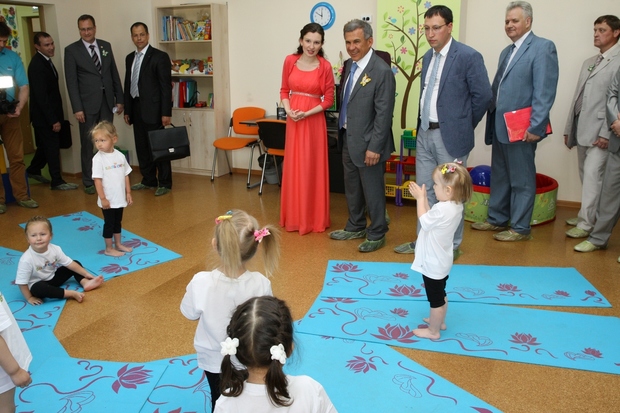
Today children's pre-school institution is a primary school. And, undoubtedly, when kids are 3-7 year old, it is very important to develop skills, which are necessary for the future life.
Actually we don't underestimate the role and the meaning of children's pre-school institutions. In general, we understand a kindergarten as a period when parents are not at home – they are working, they leave their kids in this institution. It is wrong. Today children's pre-school institution is a primary school. And, undoubtedly, when kids are 3-7 year old, it is very important to develop the skills, which are necessary for the future life.
Experts say that kids receive 70% of all necessary knowledge until they are under 7. And after this age, children gain what they gain. This is why I agree that we want to not only create kindergartens and improve their facilities and resources but also have professionals who would teach these necessary for the future life skills. As for the figures, we, indubitably, built many kindergartens: 192 establishments have appeared since 2012, that is to say, 40,000 seats.
Why do you say that it was important to create private kindergartens?
We are speaking about additional seats, new forms. We apply their work to our municipal kindergartens.
What did you like in private kindergartens?
It was interesting in general, not bad.
Do they have language learning or any educational programmes?
Kids learn different languages: Chinese, English and Spanish. Today a classic kindergarten offers the Tatar, Russian and English languages and other educational opportunities. A private kindergarten costs 15-20,000 rubles per month. I think that it is much money for ordinary families, but there are many rich people.
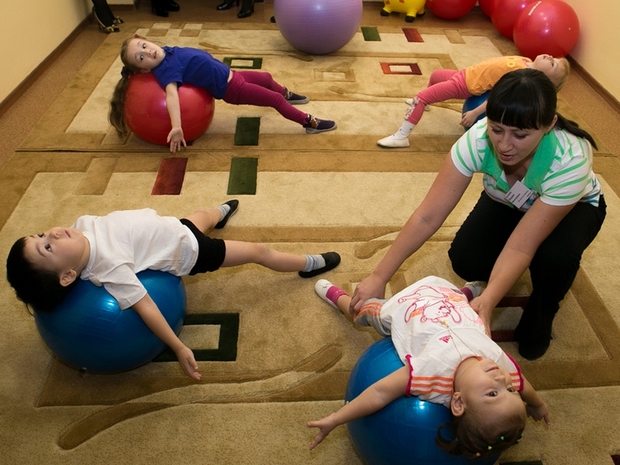
'Our teacher earns more'
I will 'jump' in my logic because I wanted to move step by step: kindergarten, primary and secondary schools. But you have mentioned the teachers. How do they appear? There was a period (especially in the 90s) when being a teacher was not prestigious in both kindergarten and school… Where should we find them?
We should prepare them, they don't exist. There is a special programme in resource centres. We discussed this topic separately and tried to improve facilities and resources, halls of residence. Today there are scholarships, according to which we send them there and they come back to work. But the last decree adopted by our President Vladimir Putin seriously changed the financial incentives, the estimate of the contribution.
If we look back at our previous talk in Innopolis, we met many people who had my native Moscow 'accent'. I ask them, 'Are you from Moscow?' They reply that 'Yes, we are'. People came to Tatarstan from Moscow. This fact says a lot.
And almost 8,000 foreign students study at our universities. In other words, the attractiveness of Kazan and other regions is growing every year. I asked in IT-park of Naberezhnye Chelny and knew that students from other regions account for 30% — they come and work here.
'We have a traditional art school, choreography and sport, while technical study groups fall a bit behind'
Could you the IT-park of Chelny speaking about the future, education and kid's technical park? Is it in Chelny or Nizhnekamsk?
It is in Chelny. It is a new story elaborated by our colleagues from the Agency for Strategic Initiatives, and it is a breakthrough project. In general, we lost many positions that existed in the Soviet Union. We had a House of Young Engineers, technical study groups. It was a good platform for the preparation of future specialists in engineering. Yes, we have a traditional art school, choreography and sport, while technical study groups fall a bit behind. I set this goal 5-7 years ago, and the Minister of Industry was responsible for supervision of the work of these technical study groups (no only the Minister of Education). We elaborated our own system. But Kvantorium is what we have today: robots, use of digital technologies and unmanned vehicles. So, another formation of people is created there.
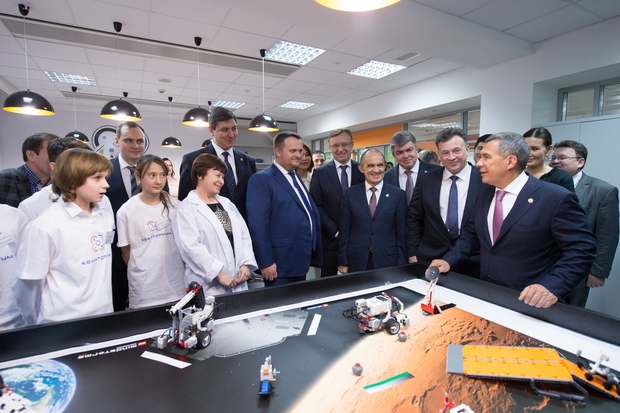
Kvantorium is what we have today: robots, use of digital technologies and unmanned vehicles. So, another formation of people is created there.
And we will build such tech parks. It was launched in Chelny. It was our first experience; it requires a lot of investments, of course. We agreed with the director of KAMAZ that he will pay a part of the costs, plus, he will send his specialists who work as constructors and technologists in KAMAZ to make them closer. Then they will go to universities… Today KAMAZ is elaborating an unmanned car. It is an absolutely new competency and new science. Who will elaborate it? Only young and new people can do it.
Who need such a car.
No, we all need it: give this task to us… We won't be able to elaborate it: there are programmes and robots – everything is to be synchronized. Such sites will appear in our country. The President Vladimir Putin supported this idea in the Agency for Strategic Initiatives, and I also appeared as a pilot region. We saw that they were not just study groups but technologies. The Agency invited the best specialists, experts who elaborated a methodology. We can build a building, buy some equipment, but a programme, which can be created thanks to the Agency, is needed to make it work and be interesting. The for Strategic Initiatives taught our teachers of these spheres during two weeks.
Is it a free tech part? How is it working? Does it stimulate them because a company can be created while playing?
There are about 400 kids there. It is free but it is quite expensive as well as for KAMAZ. But we need it. 400 children for Chelny… To start with, they have the right for supplementary education: we adopted a scheme that presupposes supplementary education. I don't know how often people visit such groups. But kids who have inclinations should be admitted: they will participate because they use it. We were said that the 5th grade is the youngest age.
'If you don't have basic education, you won't understand Google'
May I fly to the space in my discourse? I just wish to recheck it. We have mentioned Davos. The latest report of Davos Economic Forum, which was in January, states quite an interesting thing: our future lies with digital technology and their gradual implementation and robotization will have created new $100 trillion wealth in the world by 2025. It such a beautiful future. But the same Davos Forum states that robotization in EU will lead to the appearance of five new millions of the unemployed because robots substitute people. This fact causes a curious question, of course: how to unite technological process, figure, creation of money and people's fates? It is very interesting to discuss this topic, and I would like you to express your opinion.
You know, we always discuss with you what will happen: internal combustion engine, energy of a car, is it a fuel cell or rechargeable battery? We discuss even the future of TV: what future? It means that there are many topics. The main topic of Davos, where I took part, was the Fourth Industrial Revolution. Digital Technologies. Having heard everything, I understood that we were late because many professions would disappear within 10-15 years: they won't be necessary, they won't exist. At the same time, many professions should be created. The number of drivers will definitely reduce from 2025 and will disappear at all.
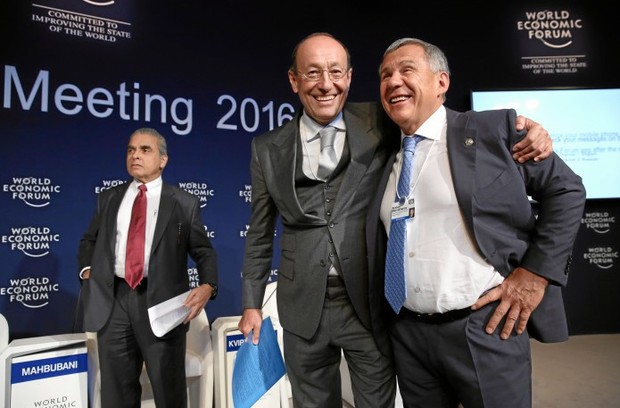
'The main topic of Davos, where I took part, was the Fourth Industrial Revolution. Digital Technologies. Having heard everything, I understood that we were late because many professions will disappear within 10-15 years: they won't be necessary, they won't exist. At the same time, many professions should be created.' Photo: wef.dc2.orphea.com
Because public transport will be unmanned.
There will be many such directions, that is we should get ready for it, first.
Secondly, I understood: people who have good education are in demand on the market because you must be a good and necessary specialist in order to be competitive. The issue on human capital appears again. Those countries whose educational level is high and there are conditions to bring talent to light will be competitive. And today the President has set us a goal – we must be leaders in the world.
It is possible: we have all the prerequisites, our people are competitive. We have different people, those who are talented, of average abilities and those have no proper education. We need to raise the average level of education, and for this reason we need to reform our pre-school, school education, and the work in universities. They must have concrete aims, that is, during school years we need reveal in which field this boy or girl will be competitive. Our aim is not only to train but also to give the minimum of basic education, and only then to choose where to go. Perhaps, he will be a developer, in that case, he or she should enter a university; perhaps, he or she will be a good specialist – then he should go to the Resource Centre, to get a good working qualification and to work.
We are still working on this, but, anyway, youth should know that the future belongs to educated, creative people who have not only a good education: if you don't have a desire to create something new, these skills won't be revealed. But desire without good knowledge – you won't achieve anything. I want to say that it is important for us to make young people understand that they should get maximum use of time and get the education. Someone may say: 'In Google there are all answers'. But if you don't have basic education, you won't understand anything in Google.
You just read my thoughts. I am also concerned about the effect: Google, Wikipedia, knowledge. Therefore, I would like to express my opinion for which you can accuse me even of anti-state position. I am for the Unified State Exam (it gives equal chances), but I am concerned about its quality. For example, recently I began to ask young people: 'Who attacked the Soviet Union, except Germany?'. And you know, 70% of responses were Austria. When I heard it for the first time, I thought – maybe Anschluss of 1938? Then they explained to me that those who studied for History exam – they have the pamphlet they all use. It is the same for the whole country, and there, in the middle of the page, the answers about the First World War end and answers about World War II start. And the last line about the First World War is 'Austria-Hungary'. Due to the fact that they study for this the exam not through understanding, but through just memorizing, then when you ask them a question, they remember this page visually and the word 'Austria'. What do you think about the quality of the State Exam? I gave you an example about History, it is clearly needed to change something here.
I agree that most people criticize this State Exam, but call me some other way how to assess the knowledge quality. It is not a fault of pupils, but of specialists in teaching methods. They do it primitive and uninteresting. Secondly, if the pupil knows History, he or she will answer any question. But it is wrong that we prepare for them some pattern, we need to change that system. But, again, they need to have basic education: the history of our country, world history, geography. You can't use Google always.
And the first answer in Google can be wrong, the fact is that we need basic education.
Yes, you can specify, to get the information quickly if only you understand the subject. For example, in engineering sciences (I have an engineer diploma)…
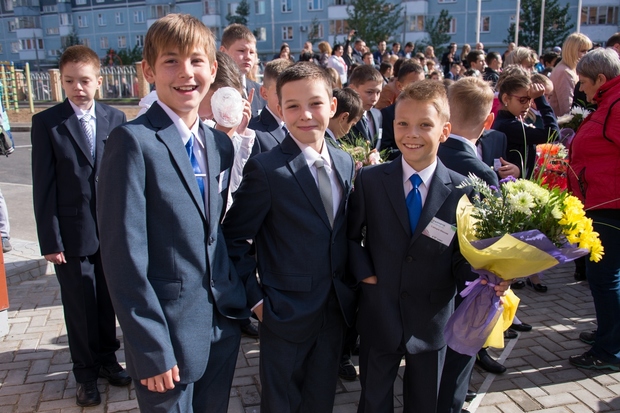
In villages there is insufficient amount of pupils. In cities we have a problem of a second school
Yes, in that case, Google won't help…
An engineer is not a person who knows everything, but one who knows how to work with information. Google is also a guide, but you should be able to use it properly. We should not scare students with the State Exam, we should train for it not only after the ninth grade. There are many things that should be corrected, but I am sure that the State Exam is necessary.
'It's not a child's fault that he is in the district where the school is not new'
You mentioned the State Council, when Putin pledged 50 billion rubles, as far as I remember, from the federal budget for the construction of schools, but he said that the main emphasis will be on the regions and municipalities. What can you say about this?
I think it is a good sign, but my position is following: a second school is inconvenient, but today it is not the main problem, it is necessary to restore the schools that we already have. We have a lot of schools in poor condition, badly equipped… And the President stated: we need to build 38 schools in the Republic. We definitely will participate in this programme. It's not a child's fault that he is in the district where the school is not new. He should have the same conditions. In villages there is insufficient amount of pupils. In cities, we have a problem of a second school. The situation in Russia and in the regions is difficult. The fact that the President allocated 50 billion rubles – it is a good sign for us and for the programme in future.
'Yes, he or she should get excellent marks and also he should win Russian olympiads or international contests'
Let's go back to the topic of the quality of the State Exam, how children enter the universities. Also, there is, of course, a good support — by the way, it's a Soviet heritage, the olympiads. I also participated in them. I think it is reasonable to use olympiads as an extra criterion to enter prestigious universities. How do the matters with participants of olympiads stand?
You know, I have a very positive attitude to this movement. More than half of our students participate in such contests, we even have a special olympiad centre, it is very good, you can even go and see it — at global level. We are the third in Russia, we have 109 winners of Russian olympiads.
Who is ahead? Moscow, Saint Petersburg?
Moscow, Saint Petersburg and then we go. We even managed to surpass Moscow region. I think, if a student does not win an olympiad, why should we give him or her a medal? For that he or she learned by rote and got excellent marks? He should show his or her worth. My opinion, yes, he or she should get excellent marks, but also he or she should win Russian olympiads or international contests. I support this direction. I think it is very important.
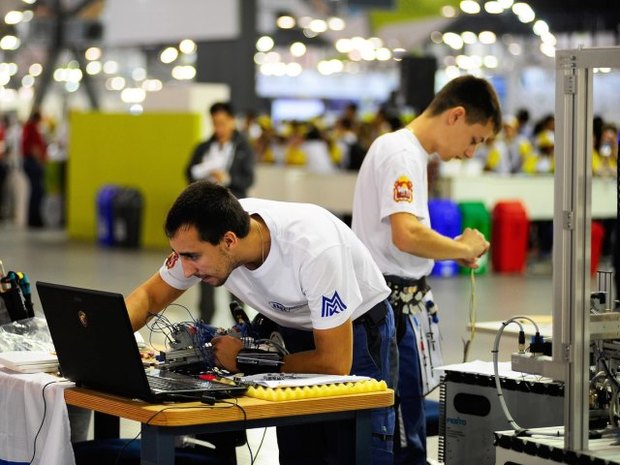
'We decided to establish 25 resource centres for the most required working professions in Tatarstan. We have about 19 now, and will establish another 25 in the near future'. Photo: u24.ru
'Our system of vocational schools has stopped, and we have nothing new'
Let's talk about the nearest future – about WorldSkills. How is the preparation going?
You know, you had the feeling that we miss the training of working professions. Our system of vocational schools has stopped, and we have nothing new. In recent years we were looking for many ways…
We decided to establish 25 resource centers with the most required working professions in Tatarstan. We have about 19 now, and will establish another 25 in the near future. Material and technical equipment, and a hiring of new staff, and most importantly – the resource centre should work within the industry or enterprises on whom it focuses. For example, in KAMAZ, Tatneft, people can also teach (and they do).
And it is really amazing that Russia in 2012 became a member of WorldSkills and announced its intention to hold a competition. Our competitors were Belgium and France (Paris). Of course, in the framework of current foreign policy, it was a challenge, but President Vladimir Putin met, firstly, with members of the delegation of WorldSkills and instructed us, Kazan, to gain that right. Of course, there was a great federal support.
It was Deputy Prime Minister Golodets who guided us, and in such serious competition we won against Paris, and Belgian city and gained that right. It is not only a desire to host something – we also want to gain experiences. The world has gone far ahead, and we need to catch up. Our aim in 2019 is to prove ourselves. Today, it was agreed to establish six interregional centres: IT, engineering industry…
'A Minister, as well as a head, and the President himself — they should know those things that will be necessary'
Rustam Nurgalievich, I am very glad that we devoted our fifth meeting of this series to the future, held it in the future, because we started this series before the presidential election, and we finish it many months after. And I am glad that today you once or twice have mentioned the term 'feelings'. How do you feel, can you learn something more in addition to the studying English?

'Our Republic has petrochemical and oil refineries – what technology we will choose to avoid heavy residues, that is, to recycle, or how we will develop the petrochemical industry — what ethylene complex, waht technologies will we choose?' Photo: Maksim Paltonov
You know, everybody should learn. We talk about education in order to set aims in that sphere. We want everyone would have basic knowledge. We are working with Skolkovo, and they hold a module for us.
Is it like a seminar?
It is not a seminar, it is a project work. And I set a task for the Ministers. First: in the framework of 'Strategy-2030' what do you want to achieve in 5 years, Mr. Minister? We listened to them yesterday, and I said: 'You didn't attend the lessons, I give you another concrete task: to develop that project'.
As I understood, you did attend the lessons?
Yes, I did, some of them didn't have enough time…
President has time, but a Minister don't. Interesting.
That is why the task is not only to teach. They need to use their knowledge to improve their work. That is, a Minister, as well as a head, and the President himself — they should know those things that will be necessary.
Or, for example, I am a chairperson of Directors Council of Tatneft. The main aim – is a resource base, so we have bitumen oil, we have oil shale, and I, before to state the problem I must understand what technologies we have. Or, our Republic has petrochemical and oil refineries – what technology we will choose to avoid heavy residues, that is, to recycle, or how we will develop the petrochemical industry — what ethylene complex, waht technologies will we choose? The President, as everybody else, should learn something new.
Does it mean that you attend lectures and seminars, and are continuing to learn?
Of course. For example, Davos: I think that something was interesting about the Silk Road… Or, we attended a session where there were developers of electric aircraft that can fly for a very long time. How did they do that? It is interesting to listen how people are implementing absurd things, and they turn out not to be absurd.
And, also, it makes money.
Not only money – it changes the world. These weird people, as we think, change the world. We, ordinary people, to go with the stream, but these people make a breakthrough. And I am interested in seeing these people, listening to them. German Gref makes a lot of interesting things: he sets tasks at every meeting. For example, why do I say '70% a child acquires skills till the age of seven'? Gref told this. For example Davos, if I hadn't attended, it wouldn't have imbued my mind. I would think that it doesn't concern us, the forth industrial revolution…
Thank for the interview, Rustam Nurgalievich.